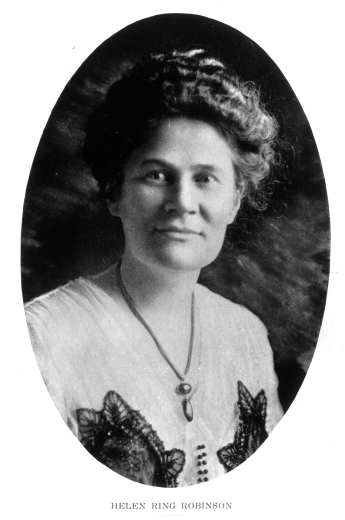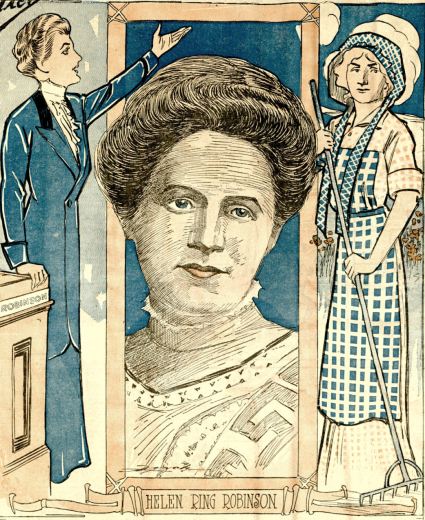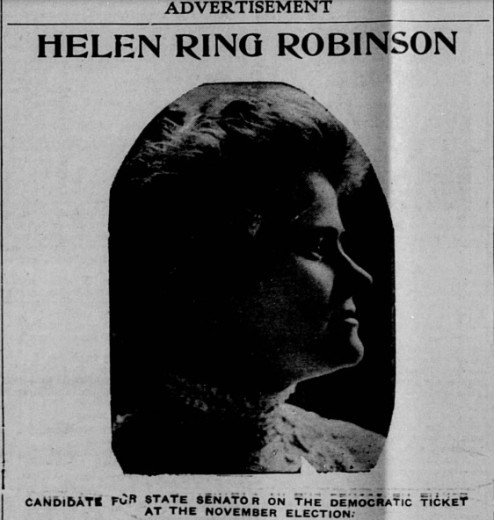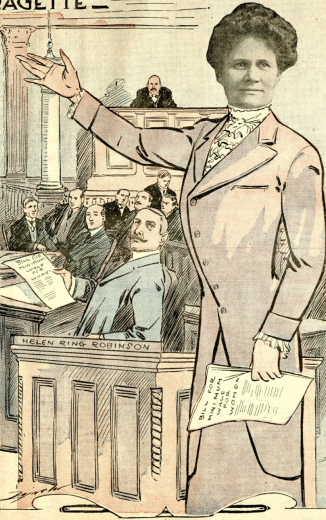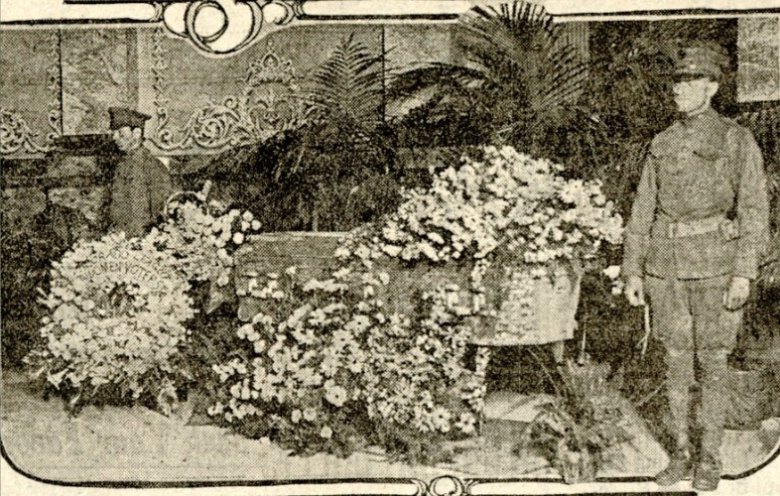Helen Ring Robinson was the first woman to serve as senator in the Colorado Legislature.
Helen Margaret Ring was born sometime around 1860, according to most sources, in Eastport, Maine. Helen was the sixth child of Thomas Warren Ring and Mary Ring. Little is known about her family or early life. As a child, her family moved to Providence, RI where she attended elementary and high school. She graduated from Providence High School around 1878 and, two years later, she was listed in the 1880 census as a widow working as a cashier in a restaurant. Little is known about her first husband. In 1881, she was enrolled as a student at Wellesley College. At the time, it was very unusual for a woman without family wealth to be attending college at all.
Sometime before 1890, she moved to Cleveland, Ohio, where she served as associate principal at the Hathaway-Brown School. Her focus was on supervising education in the Natural Sciences Department. She spent the summer of 1892 visiting Colorado and fell in love with the climate. She moved here the following year. That year, 1893, was the same year that women in Colorado secured the right to vote. While Helen would become a powerful voice for the rights of women, she later admitted that she had opposed women’s right to vote prior to moving to Colorado, and that the political atmosphere in Colorado made her change her views. Her new life in Colorado brought her to an Episcopal school named Wolfe Hall that prepared girls for college. She enjoyed teaching literature and later said that she believed literature allowed people to connect with the experiences of others and develop empathy for their struggles and accomplishments.
Helen would go on to teach at the Miss Wolcott School until she married a lawyer named “George” Ewing Robinson in 1902. Ewing had a daughter who Helen treated as her own child. While Helen enjoyed teaching, having a partner made it easier for her to pursue her other interests. She began writing for newspapers and other publications. She would also focus more and more on the cause of national suffrage for women and other social justice issues. She became part of what was known as the Progressive Era of the early 1900s. She began speaking regularly before important groups in the city like the Denver Woman’s Club. She would frequently speak about the role of women in politics, and rallied women to fight against corrupt politicians who served their friends rather than the people.
Recognized for her writing and civic engagement, she was made president of the Denver Women’s Press Club in 1908. In 1910, she was fighting for the citizens of Denver to have control over their own drinking water rather than letting it fall to a public utility company that might be more concerned with profit than the welfare of citizens. She also joined Judge Benjamin Barr Lindsey in speaking out for the rights of children. Helen and others believed that having women in government in Colorado had been a benefit to previously overlooked groups like the poor and children. She also believed that the future of the state depended on how well we educate children. While many thought she would be better suited to a position in a state or local education office, she announced her run for state senator in 1912.
Helen promised Colorado voters to continue fighting for the same causes she had been speaking and writing about for years. She attracted supporters among women, African Americans, clergy, union members, and others. When the election came, she won with over 24,000 votes. Before she was even seated in the state legislature, she began pushing for the right of women to sit on juries. At the time, in much of the country, women charged with crimes would be judged by an all-male jury. In Helen’s words,
“There is no reason why women should not sit on a jury. Having made some study of the male juror, I shouldn't consider the objections of ‘prejudice and emotions’ as valid. Indeed, if we admit the objections raised against women jurors, we might have to bar men and get some sort of mechanical jury machine.” - Rocky Mountain News November 15, 1912
A month after this statement, a scandal erupted involving the mistreatment of patients at an asylum in Denver. She immediately pointed out that this was a larger issue of poor conditions in institutions treating those with mental illnesses, and sought to improve those conditions.
As soon as Helen was sworn into office in January of 1913, she put forth a bill to allow women to serve on juries and called for an investigation of the asylum in Denver. The bill regarding juries would fail by a single vote. That same month, she introduced legislation that would increase regulation of food and medicines. At this time, it was common for food and medicines to be mislabeled and/or produced in unsafe conditions. In the early 1900s, many children died from contaminated milk and other unsafe products. Helen even put forth a bill that would set a minimum wage for working women and children. The bill required jail time for employers who refused to follow the law. Both the minimum wage bill and health bill passed the Colorado Senate. Minimum wage would become law, but the health bill failed.
After her initial successes making progressive reforms in the Colorado Senate, her national reputation only grew. She began traveling the country to places like New York and Baltimore to promote the cause of national women’s suffrage and the rights of women and other workers more generally. In 1914, Helen traveled to Canada to speak and to learn more about how they settled labor disputes, particularly in the mining industry. A few months after her visit to Canada, Colorado experienced the Ludlow Massacre in which a number of striking miners, women, and children were murdered by a militia hired by the Colorado Fuel & Iron Company. Helen, along with at least 1,000 other women, showed up at the Capitol to demand that Colorado Governor Ammons end the bloodshed and support reforms. Within a few days, the Governor requested federal troops from the government to come help.
After the dramatic fight with the governor to defend the rights of miners and their families, Helen and others decided the right to such political speech needed to be reinforced. In May of 1914, a branch of New York’s Free Speech League was opened in Denver. The league had members from all walks of life and the goal of the organization was simply
“To exercise their rights to express freely and publicly on all subjects.” - Rocky Mountain News May 25, 1914
She pushed again for a bill allowing women to serve on juries as well as a proposal to establish a women’s reformatory. The reformatory would allow women and girls convicted of crimes to be taught job skills that would improve their lives once they were released. There was already such an institution for men and boys.
Helen only served one four-year term in the Senate, but that was not the end of her activism. In 1915, she and more than 100 other pacifists traveled to Europe on a “Peace Ship” funded by car maker Henry Ford. They visited several European countries to urge an end to World War I. In 1918, she published a book called Preparing Women for Citizenship. The 19th Amendment giving women the right to vote in national elections passed the U.S. Congress one year later.
Helen died on July 10, 1923. She was only the second woman to lie in state at the Colorado Capitol, so that the people could come and pay their respects to her prior to burial. In 2014 she was inducted into the Colorado Women’s Hall of Fame.
widow - a woman whose husband has died
suffrage - the right to vote
Progressive Era - a period in which political groups were working to weaken corporate power, strengthen unions, and increase the rights of individuals
minimum wage - the lowest amount an employer can pay a worker
pacifists - people who oppose most or all wars
lie in state - putting the body of a well-known individual on display in a public space so that people can pay their respects before the person is buried
What part of Helen's life do you think made her interested in politics?
What kind of challenges do you think she faced being the first woman in the Colorado Senate?
Have you ever been among the first among your friends or family or classmates to accomplish something? What was that experience like?

